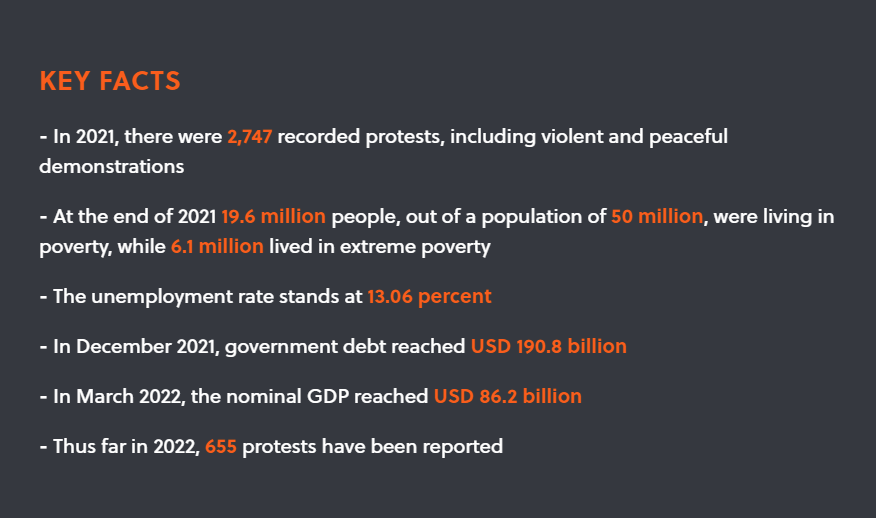Petro's promises: Can new President Gustavo Petro enact the change he has campaigned for?
On 19 June, Gustavo Petro celebrated his victory as Colombia’s first elected leftist president. Many of Colombia’s leftist movements are historically synonymous with violent insurgency, and this legacy has negatively permeated popular perceptions regarding the political left. But Petro’s campaign promises of reshaping Colombia’s highly unequal society, leading the fight against climate change, introducing free university education and reforming Colombia’s approach to organised crime seems to have shifted public opinion in favour of giving the left a chance.
While Petro’s win may signal voter frustration with previous right-wing administrations due to their inability to quell rising inflation, unemployment and gang violence, this does not necessarily mean that his ambitious reform agenda will experience a smooth implementation. Petro certainly faces significant challenges, and it remains unclear if he and his administration have the influence and resources to achieve his campaign promises. Most pressing are the socio-economic frustrations that drove mass unrest in 2021, with protests paralysing the country for months over increased taxes, corruption allegations and proposed health care reforms. With current global fuel price increases and the rising cost of living, coupled with political infighting, Petro will likely struggle to address the more immediate drivers of unrest, which could hamper the government’s ability to focus on major structural changes in the coming months.

CHALLENGES TO PETRO’S REFORM AGENDA
Petro’s proposed policy reforms will require deep transformations, significant backing from Congress, and substantial budgetary capabilities. Yet, Colombia collects less tax as a percentage of its gross domestic product compared to almost all other countries in South America. Colombia’s sovereign debt presents a further challenge; despite former president Iván Duque’s efforts to increase taxes to pay off this debt, public outrage prompted protests numbering hundreds of thousands of people. As a result, the president withdrew the tax reform. However, he stood firm that it remained a necessity for Colombia’s prosperity.
Petro’s coalition, the Pacto Histórico, will also struggle to convince Congress – in which it lacks a majority – to accept its more left-leaning initiatives such as free education, pension reforms and increased wealth tax reforms. Concessions will be necessary to ensure the requisite support for his policies, which will likely result in a significantly watered-down version of his initial promises. Petro also has many opponents amongst the business elite, most of whom have benefitted from the country’s structural inequality and corruption, and may feel threatened by the president’s plans to impose additional taxes on high earners to, for example, raise 14 billion pesos (USD 3,4 million) for investment in education.
THE CONSEQUENCES OF FAILURE: OVER-PROMISED AND UNDER-DELIVERED
Recently elected leftist candidates in Latin America, running on similar platforms to Petro, have struggled to fulfil campaign promises. In both Chile and Peru, leaders Gabriel Boric and Pedro Castillo made ambitious and socially progressive promises during their campaigns that also included changes to environmental regulations, gender and racial equality, and tax increases to fund social programs. However, both leaders’ popularity declined significantly as the reality of entrenched political and economic systems, and the need to address more immediate socio-economic concerns such as rising fuel costs, set in. Boric’s support has plunged 34 percent since his inauguration in March 2022, while by April 2022, after eight months in office, Castillo had faced two impeachment attempts with 63 percent of participants in a countrywide survey indicating that the president should resign rather than complete his term until 2026. The perceived failure of these new leftist governments to make good on their promises, and address rising poverty and inequality, has triggered frustration and unrest.
Petro’s win must be understood in the context of deep social unrest, political polarisation and expanding conflict in rural areas. Petro’s victory came down to his ability to read the pulse of the country; including public frustration with daily economic suffering and elite corruption. However, if Petro's spirited pledges do not materialise, it is entirely feasible that a hopeful-turned-disappointed electorate could follow in their Chilean and Peruvian counterparts' footsteps and protest. There is already a precedent for violent anti-government unrest driven by rising inflation, the peso's depreciation and pandemic-related restrictions. Major civil unrest last year resulted in at least 28 deaths at the hands of police. After the intense period of unrest, polling showed that 82 percent of Colombians had a negative perception of the country’s then political parties. However, Petro can take notes from Chile on how not to escalate unrest or draw further public ire by limiting the use of excessive force in cracking down on demonstrations – a tactic which typically fuels the flames of anti-government movements.
If Petro is unable to at least show some progress in fulfilling his campaign promises during his first quarter as president, his presidential run may just mirror that of Boric and Castillo. While he still has the potential to avoid an escalation into political violence, the expectations that Petro has set are so high that in the absence of concrete reforms, disappointment remains a distinct possibility.
